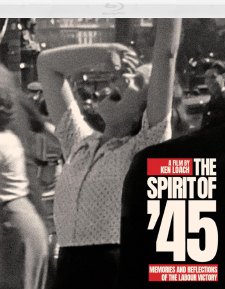Spirit of ‘45, The (Blu-ray Review)

Director
Ken LoachRelease Date(s)
2013 (May 28, 2024)Studio(s)
Fly Film Company/Sixteen Films/Film4/Channel Four (The Film Desk/Vinegar Syndrome)- Film/Program Grade: A-
- Video Grade: A-
- Audio Grade: A
- Extras Grade: A-
Review
A fascinating documentary by filmmaker Ken Loach, The Spirit of ’45 (2013) wistfully celebrates Great Britain’s socialist movement in the years following World War II, a revolutionary decade that saw the creation of the National Health Service and the nationalizing of Britain’s railways, power grid, coal mines, and building of affordable housing for the country’s working class. It’s unabashedly pro-socialist, most obviously so when, about two-thirds of the way through the 99-minute film, the story suddenly fast-forwards to the era of “austerity,” privatization, and Margaret Thatcher, when Loach and his interviewees don’t hold back their displeasure.
These mostly elderly interviewees, old enough to have been children before the war, nurses, young coal miners, aspiring trade unionists and the like, recall the Dickensian conditions in the 1930s, before Hitler invaded Poland. They remember housing so terrible not only were children sleeping five or more to a bed, but that these homes were so vermin-ridden, it was common for these beds to be completely invested with hundreds of fleas and lice. Children climbed into such beds every night anyway. What other choice did they have?
In another compelling moment, one interview subject notes that, at the time, the United Kingdom was the wealthiest nation on earth, its richest citizens enjoyed unparalleled luxury, yet its poverty was worst in all of Europe.
After the war, despite all the destruction wrought from the Blitz and a country on the cusp of financial collapse, the British people were not about to go back to that prewar existence. The general election of 1945 was a stunner, a landslide victory for Clement Attlee’s Labour Party over Winston Churchill’s Tories. In contrast to the Tory policy of “rugged individualism” and inherited privileges, Attlee was determined to rebuild Britain as an ethical commonwealth based on public ownership and set about eliminating the extremes of income inequality, with new minimal standards of healthcare and housing particularly as basic human rights. As its architect, William Beveridge put it, Britain strove to eliminate the Five Great Evils: Want, Disease, Ignorance, Squalor, and Idleness.
Over the next few years Attlee’s government nationalized the steel industry, gas and electrical utilities, civil aviation, the coal mines, railways, and even the Bank of England. Jobs became more secure, wages increased, working conditions improved markedly, coal miners worked under far safer conditions, and the maze of competing private railways was streamlined and made far more efficient. Under Aneurin Bevan, more than one million new and affordable houses were built for the working class between 1945-51.
The shining star of the British Welfare State was, unquestionably, the creation of the National Health Service (NHS): universal, free-of-charge health care for one and all. One nurse interviewed for the film remembers an old man who, perhaps for his entire adult life, relied on the cut-out bottom of a glass bottle to see when, at last, as an old man he received his first-ever pair of eyeglasses. His were one of 5 million pairs issued that first year alone. Deaths from malnutrition, pneumonia, tuberculosis plummeted.
Many of these programs fell short of their immense ambitions, partly because, in many cases, political appointees in charge of some of these programs were the same rich, conservative industrialists that controlled or had a financial stake in these industries before they were nationalized. Nevertheless, overall, living and working conditions for millions of Brits improved dramatically.
The polemic aspects of Loach’s film manifest about two-thirds of the way through The Spirit of ’45, when its story shifts abruptly to the ascension of Tory Margaret Thatcher as Prime Minister in 1979 and her aggressive privatization and dismantling policies, a legacy which spiked poverty, reduced life expectancies, and greatly diminished even Britain’s once-cherished NHS. Deliberately make the service so dysfunctional that the public will demand privatization. And so it goes.
Although the players and historical events will be much less familiar to American viewers, Loach’s excellent use of archival film clips and newer interviews make compelling viewing that will resonate, as so much of what was going on in Britain before and after the war is still so relevant. Indeed, there are little jabs at American policies throughout, particularly its lack of universal healthcare: “I do hope,” one retired nurse says, “we don’t go down the American system whereby you come in with broken legs or whatever and someone with a clipboard says, ‘Are you insured?’” As Bevan once said, “No society can legitimately call itself civilized if a sick person is denied medical aid because of lack of means.”
Even on a big screen, The Film Desk’s Blu-ray of The Spirit of ’45, in 1.85:1 widescreen, impresses with its use of choice film clips and new interviews. Partly the use of old film footage works because the audio, billed on the packaging as DTS-HD 1.0 mono, is actually stereo surround, with the surround effects and music giving an immersive quality usually missing in such things. Optional English subtitles are provided on this Region “A” encoded disc.
Extras consist of an excellent 24-page booklet, featuring a new essay by Sukhdev Sandhu, an interview with Loach by Gavin Smith, and a transcript of a BBC appearance by Loach on the program Newsnight, during which he debates Nigel Lawson. A trailer rounds out the supplements.
The Spirit of ’45 is a fascinating, informative, and still-relevant film deserving of a wider audience and recommended.
- Stuart Galbraith IV

